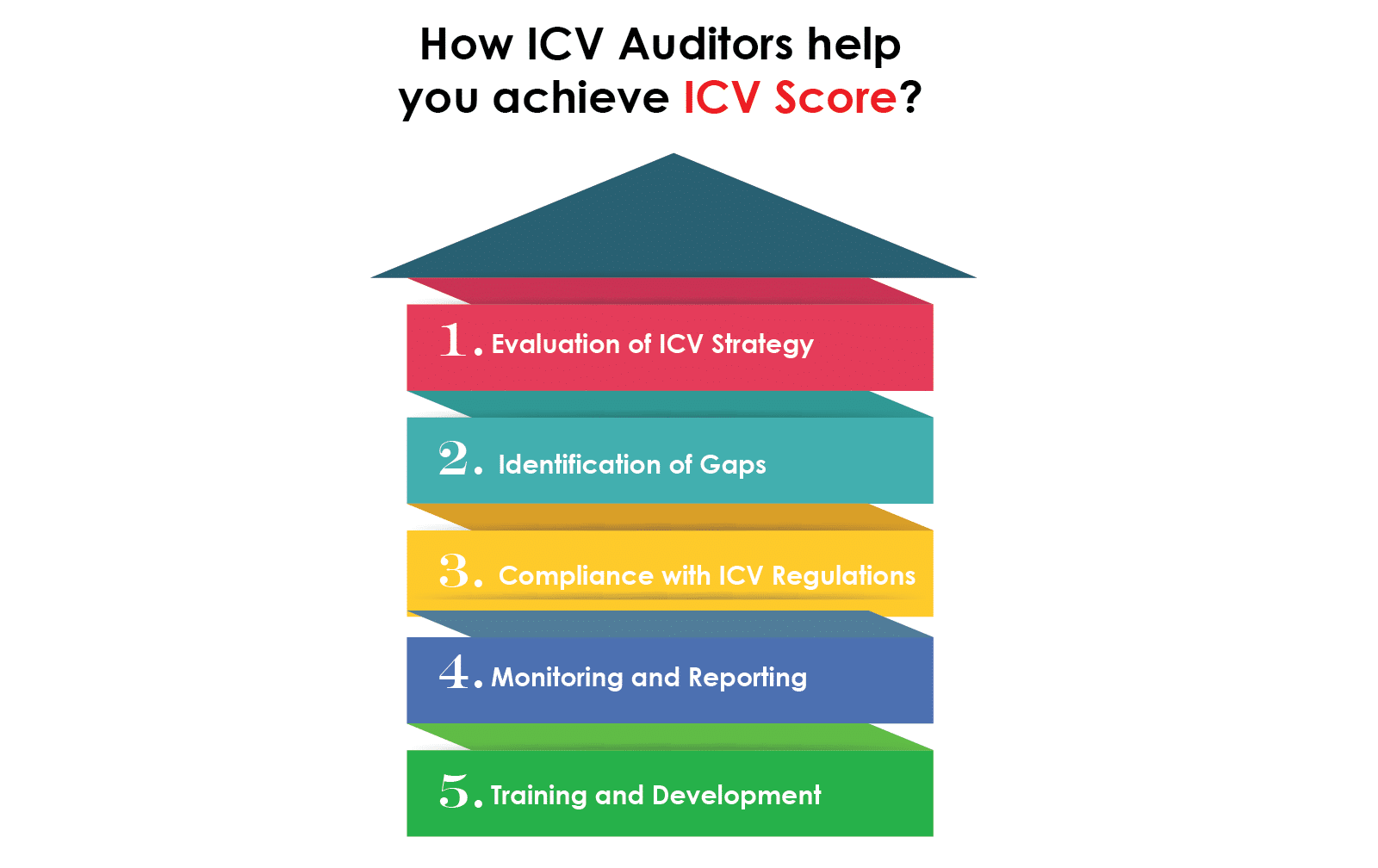
ICV score
In-Country Value (ICV) is a measure of the economic impact of a company’s operations in a particular country[1]. It is used to determine the level of localization of a company’s supply chain and the extent to which it contributes to the economic development of the host country. In most cases, an ICV certificate ensures a good ICV score.
Why improving the ICV score is important for a company?
A good In-Country Value score can bring many benefits to a company. A high ICV score can give companies a competitive advantage in the host country. It can demonstrate a commitment to responsible business practices and good corporate citizenship, which can be attractive to customers, suppliers, and other stakeholders.
What is ICV Score Improvement Plan?
ICV program was enhanced in November 2018 launching a new improvement plan[2] and ICV formula with 5 percent ICV payment. Suppliers must submit an improvement plan along with their commercial proposal. The improvement strategy is regarded as 1 binding which shouldn’t be altered. Through the evaluation, the improvement strategy and ICV Certificate would be combined to determine the overall score. The supplier with the maximum general score would be advanced towards equating to a target cost with his own provided ICV. The target should be met regularly to verify the supplier is on the right path. Any deficiency discovered must be disclosed to the provider so that a timely corrective measure may be implemented. To assure ICV accomplishment, a 5% threshold of the contract amount would be implemented. Annual consequential installments would be paid based on ICV target compliance. Suppliers must produce the relevant ICV certification to verify the accomplishment of the ICV target for the specific payment to be released.
When ADNOC tender requires, the Supplier shall submit an ICV Improvement Plan along with the commercial bid. Based on the requirements specified in the tender, the Supplier shall fill either the “Company Specific” or “Agreement Specific” ICV Improvement plan template. It includes the following steps:
- The supplier should provide an improvement plan
- The ICV Certificate and Development Program will be combined to determine the final score, with the highest total score being prioritized
- Any deficit must be reported to the supplier for an urgent action plan for repair
- Progressive annual payments must be provided in accordance with the ICV aim
- The supplier must provide the necessary ICV certificate to demonstrate completion of the ICV phase in order to release the appropriate payment.
How to improve ICV score?
Here are some strategies that companies can use to improve their ICV score;
- Increase local sourcing
By sourcing more goods and services from local suppliers, a company can increase its ICV score and also support the development of the local economy. Companies can also consider setting up local production facilities to further increase their ICV score. In addition, sourcing from local suppliers can help to reduce costs associated with transportation, logistics, and tariffs, which can have a positive impact on a company’s bottom line.
- Develop local talent
Investing in local workforce development can help a company increase its ICV score and also improve its relationships with local stakeholders. This can be done through training programs, apprenticeships, and other initiatives that aim to develop the skills of local workers.
- Collaborate with local partners
Collaborating with local partners, such as universities, research institutions, and other companies, can help a company increase its ICV score and also gain access to new technologies and knowledge.
- Invest in local infrastructure
Investing in local infrastructure can help a company increase its ICV score and also support the development of the local community. This can include investments in road, water, and power infrastructure, as well as educational and healthcare facilities. Investing in local infrastructure can also help to improve access to resources for local communities and businesses. This can include improving access to water, power, and transportation
- Be transparent and communicative
Being transparent and communicative about a company’s ICV initiatives can help to build trust with local stakeholders and demonstrate a commitment to responsible business practices.
Role of ICV management system
In addition to these strategies, companies can also consider implementing a comprehensive ICV management system, which can help to systematically measure, track and improve their ICV performance. This can include setting ICV targets, monitoring ICV performance, and implementing a continuous improvement process. It is also a good step for obtaining an in-country value certificate.
Compliance with Laws and Regulations
Another important aspect of improving the ICV score is to comply with the regulations and guidelines set by the host country. Many countries have specific ICV regulations and guidelines that companies must comply with in order to do business there. This includes reporting requirements, local content requirements, and other regulations that may vary from country to country.
In conclusion, improving a company’s ICV score is a smart strategy for companies that want to increase their competitiveness, build better relationships with local stakeholders, and support the economic development of host countries. By implementing these strategies, companies can increase their ICV score and also benefit from the many advantages that come with it. Companies should be diligent in complying with regulations, certifications, and guidelines set by the host country, and continuously monitor and improve their ICV performance.
Choose the Best Certifiers
one of the very few certifiers in the UAE that provide ICV certificate services. With the help of expert certifiers,







